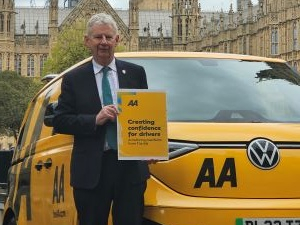ZEV mandate revisions draw polarised reactions
The UK’s automakers, climate groups and charging and fleet firms have responded to the ZEV mandate changes with deeply polarised reactions.
The changes, announced Sunday night, respond to the US tariffs and will deliver new flexibilities for the ZEV mandate while also allowing new hybrid cars on sale until 2035 along with ICE vans.
The revisions follow the recent industry consultation but have reportedly been fast-tracked in response to the US tariffs while also responding to concerns about the challenges of electrification and warnings of a ‘crisis point’ from vehicle makers.
The Society of Motor Manufacturers and Traders
Mike Hawes, chief executive

Mike Hawes, chief executive, SMMT
“The Government has rightly listened to industry, responded quickly to global dynamics and recognised the intense pressure manufacturers are under.
“Industry remains committed to decarbonising road transport but the ZEV mandate targets are incredibly challenging, especially with a paucity of consumer demand and geopolitical upheaval.
“Growing EV demand to the levels needed still requires equally bold fiscal incentives, however, to give motorists full confidence to switch.
“We await full details of the regulatory amendments but, given the potentially severe headwinds facing manufacturers following the introduction of US tariffs, greater action will almost certainly be needed to safeguard our industry’s competitiveness. UK–US negotiations must continue at pace, while the long-awaited industrial and trade strategies should prioritise automotive and be delivered at speed.”
Europcar Mobility Group UK
Tom Middleditch, head of electric mobility
“There is a concern that by reducing the pressure on manufacturers, businesses and private motorists will be less motivated to make the switch to zero tailpipe emissions.

Tom Middleditch, head of electric mobility at Europcar Mobility Group UK
“Sadly additional credits for EVs registered on rental fleets was not part of yesterday’s announcement even though rental operators could play a more fundamental role, delivering an effective alternative to the bigger commitment of leasing or purchase for businesses and private motorists. Nor did the Government’s plans include any measures to reduce the cost of public charging or any initiatives to educate motorists on the benefits and ease of electric motoring, both of which are critical to growing the electric vehicle parc.
“The Government clearly has a challenging task on its hands right now, but it is vital that the role electric vehicles must play in reducing carbon emissions is not forgotten.
“Europcar has made a significant commitment to electric motoring and, despite the lack of any government support, we have no intention of taking our foot off the pedal.”
The AA
Edmund King, president
“Yesterday’s announcements are a pragmatic step forward which we hope will help manufacturers and give confidence to drivers.

Edmund King, AA president
“The inclusion of hybrids can act as a stepping stone to help those not yet ready to make the full switch to electric.
“Our consistent message to government is more needs to be done to make EVs accessible for everyone. Generally, drivers are hesitant, but most are not hostile to the change.
“Help is needed to stimulate demand for EVs including broader fiscal incentives. Drivers still raise concerns about cost of purchase, cost of charging and availability of chargers. Range anxiety itself is a thing of the past as AA breakdown figures show only 1.85% of all EV breakdowns are due to running out of charge compared to approximately 1% of ICE vehicles running out of fuel.”
Logistics UK
Michelle Gardner, deputy director – policy
“Vans are the workhorses of the UK economy, and our members will welcome the clarity yesterday’s announcement gives that petrol and diesel vans can be sold alongside full hybrid and plug-in hybrid vans until 2035.

Michelle Gardner, deputy director – policy, Logistics UK
“The sector is fully committed to decarbonisation, but commercial vehicles are acquired and used very differently to cars, and zero tailpipe emission vehicles must make commercial and operational sense before businesses can incorporate them into fleets.
“There are still significant barriers preventing more widespread adoption, and our members cite increased vehicle costs, lack of usable public charging, the time and cost of installing infrastructure at depots and higher regulatory burdens.
“These are practical concerns that need to be addressed, and we continue to urge government to work closely with the logistics industry and give operators the confidence to invest in green fleets while ensuring the resilience of the UK’s supply chains moving and delivering the goods that we all rely on every day.”
ChargeGuru UK
Denis Watling, managing director
“While industry reaction to the ‘diluting of the ZEV mandate’ and subsequent electric vehicle sales targets is largely negative, we are hopeful that the impact on the market will be minimal.

Denis Watling, managing director of ChargeGuru UK
“We’ve reached a natural tipping point within the industry. Consumers are driving demand for EVs, and the sector is far less reliant on government intervention or subsidy than it was five years ago.
“From a consumer perspective, it makes sense to purchase an electric vehicle over an ICE for around 80% of the population. They’re cheaper to run overall, have a much lower carbon impact and offer a better driver experience with lower requirement for maintenance.
“As long as the industry keeps innovating to enable more people to charge their EV at home, we’re hopeful that, in line with consumer demand, yesterday’s news won’t affect the overall trajectory of the market.”
The Vehicle Remarketing Association (VRA)
Philip Nothard, chair
“The big issue for the VRA – and for the wider car and van sectors – remains the used market.

Philip Nothard, chair at the VRA
“We were signatories to a letter sent to government by the BVRLA last week making a strong case for more support during the transition to electrification, and we’d like to see signs that the Government recognises the growing problems we are facing.
“While used electric cars are currently selling quickly, residual values are extremely poor and there are much greater volumes of electric vehicles heading to the used market very soon.
“More needs to be done to make buying a used EV practical and cost-effective for more people, which means everything from assistance with purchasing to creating a more accessible and affordable charging infrastructure.”
Be.EV
Adrian Fielden-Gray, chief operating officer
“The news is yet another example of there being too much ‘stick’ and not enough ‘carrot’ when it comes to EVs.

Adrian Fielden-Gray, COO, Be.EV
“The Government keeps thinking about car manufacturers, but they need to instead focus on incentives for drivers making the switch to electric.
“Whilst there are references to £2.3bn and helping ‘working people’, we are crucially missing the detail of this. In practice, the EV driver keeps losing out.
“In the last few years, they’ve lost the home charging grant, they’ve lost purchasing grants, and most recently they’ve lost the exemption on vehicle excise duty.
“At a time where people are hesitating to switch, focus should be put on incentives and helping the making the transition to electric easier than ever.”
Vaylens
Russell Olive, UK director
“The rule relaxation is a pragmatic move, but fleets can’t steer through uncertainty alone.

Russell Olive, UK director, Vaylens
“From a macro perspective, businesses running EV fleets, whether that’s delivery vans, logistics vehicles or company cars, may not be on the frontline of trade disputes, but they’ll still feel the effects. And with EV costs rising and model availability increasingly shaped by global trade tensions, stable, scalable infrastructure will be critical to maintaining fleet EV momentum.
“Extending the hybrid sales window may ease short-term pressures, but long-term challenges remain: for example, how do we streamline access, reimbursement and data management across all charging scenarios? That’s why continued investment in reliable, easy-to-manage charging systems, from depot to home to public is essential to keep businesses committed to electrification, regardless of what happens at the factory gate.”
EVA England
Warren Philips, chair
“The [EV] transition will not take hold on its own and it is disappointing no additional measures were included yesterday for drivers who, similarly to car manufacturers, need some support to make the switch.

Warren Philips, chair, EVA England
“We need government input to tackle high EV upfront costs in the short term and to help more households access charging affordably, especially for those who can’t easily plug in at home.
“Failing to tackle prevailing barriers to uptake will scupper the Government’s rightly ambitious targets to move away from petrol and diesel this decade.
“We look forward to working with the Government on its Industrial Strategy and beyond to ensure these essential measures are considered and the transition to electric is shaped with drivers’ needs in mind.”
Climate Group
Dominic Phinn, head of transport
“The Government is sticking to the 2030 phase-out for petrol and diesel cars – that’s the good news.

Dominic Phinn, head of transport, Climate Group
“But introducing flexibilities to legislation that is clearly doing its job confuses the market and hampers the roll-out of infrastructure.
“The UK’s ZEV mandate is a global success story which turned the UK into a leader in the transition of road transport. If we want to keep it that way, the Government should bring together the energy, charging and public sector, together with the car industry, to speed up, not slow down, the UK’s charging and grid infrastructure.
“A competitive car industry will inevitably be driven by confident EV leaders, not by those asking for ever more flexibilities to a framework that’s designed to help them along.”
T&E
Anna Krajinska, director

Anna Krajinska, director T&E UK
“Weakening the ZEV mandate over American tariffs is baffling, especially when most of our car exports to the US are still petrol and diesel.
“Rolling back EV targets won’t protect those exports or jobs.
“What the sector really needs is regulatory certainty and a robust industrial strategy to support domestic manufacturing and stay competitive as the world goes electric.”
FleetCheck
Peter Golding, managing director
“In the company car sector, successful adoption has been powered by taxation advantages – especially zero or very low Benefit-in-Kind.

Peter Golding, managing director at FleetCheck
“There is nothing resembling the same level of assistance in the electric van market and, as a result, no real impetus for change. This is the area where the Government needs to act.
“Yesterday’s revisions are all about supply but it’s arguable that the real problem lies with demand.
“We speak to fleet operators almost every day who are unimpressed by the prospect of electric vans to the extent that their current plan is to operate their existing diesel vans for as long as possible.
“More needs to be done to change this mindset.”
Sogo Mobility
Chris Joyce, managing director
“We’d like to see investment in the UK’s charging infrastructure go further, which is essential to accelerating the pace of adoption for BEVs.

Chris Joyce, MD, Sogo Mobility
“For wider adoption to be realistic, we must address the imbalance between those who can charge at home and those forced to use the public network.
“By reducing fines for manufacturers unable to meet initial targets and permitting greater flexibility in balancing annual sales requirements, the Government supports a more adaptable environment for the automotive industry.
“Overall, these measures will deliver a smoother, more sustainable shift towards electrification within the fleet sector.”
National Franchised Dealers Association (NFDA)
Sue Robinson, chief executive officer
“We welcome the changes made as a step in the right direction for the UK automotive sector; however it is vital that more incentives are available to encourage the consumer to move to EVs.

NFDA chief executive Sue Robinson
“The electric vehicle targets remain in place and the fines still remain too high for manufacturers. The UK remains the most aggressive regime for the EV transition and we would want the UK government to align with the rest of Europe, in order to make our market as competitive as possible in a rapidly changing global marketplace.”
















Leave a comment